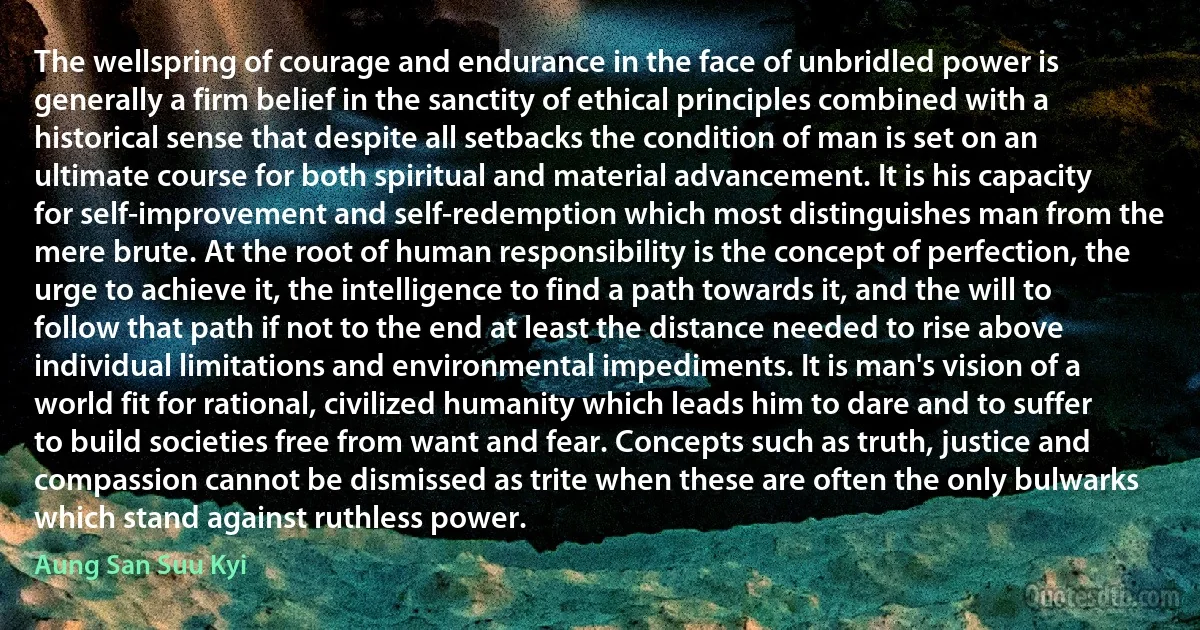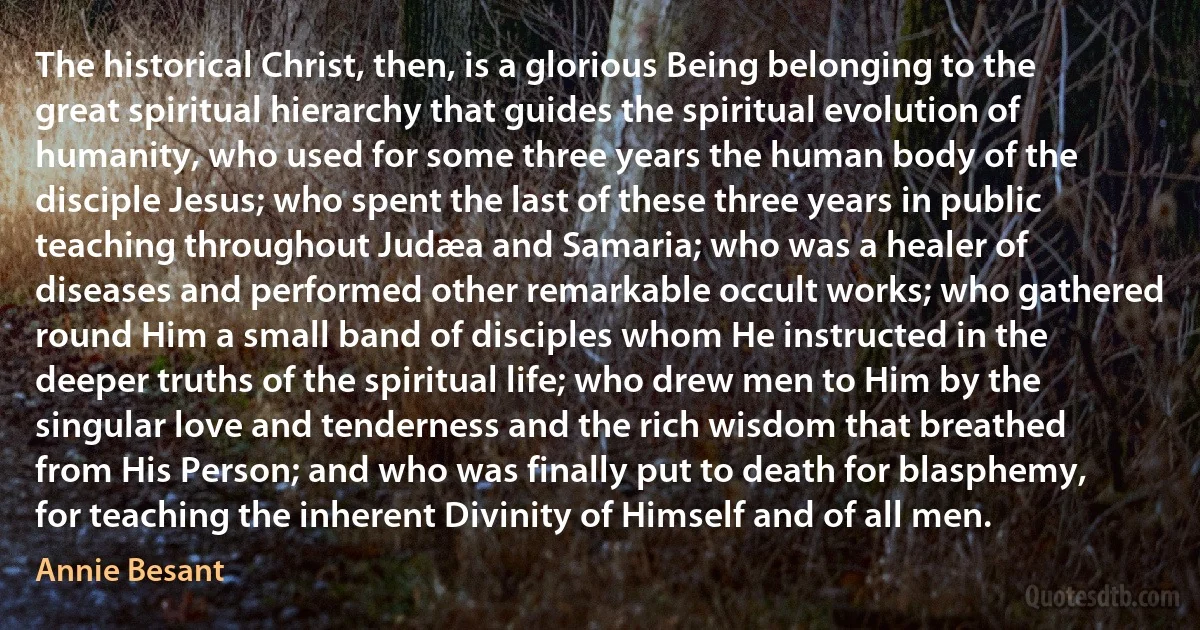Historical Quotes - page 46
I remember 1989 vividly, having spent much of that summer in Berlin before the Wall fell. And while largely peaceful revolutions swept through Central and Eastern Europe that year (it was only three years later, in Yugoslavia, that the death of Communism sparked war), there was no such turning point in China, where 1989 also saw the Tiananmen Square massacre. With the benefit of hindsight, the survival of Communism in China was a more significant historical phenomenon than its collapse east of the River Elbe.

Niall Ferguson
What blinds us, or what makes historical progress very difficult, is our lack of awareness of our ignorance. And [I think] that beliefs should be put aside, and that a psychedelic society would abandon belief systems [in favor of] direct experience, and this is, I think, much of the problem of the modern dilemma, which is that direct experience has been discounted, and in its place, all kind of belief systems have been erected. ... If you believe something, you're automatically precluded from believing in the opposite, which means that a degree of your human freedom has been forfeited in the act of this belief.

Terence McKenna
... the imperialists really have no religious belief, Christian or Islamic. Rather, throughout this long historical period, and going back to the Crusades, they felt that the major obstacle in the path of their materialistic ambitions and the chief threat to their political power was nothing but Islam and its ordinances, and the belief of the people in Islam. They therefore plotted and campaigned against Islam by various means.

Ruhollah Khomeini
I'm just a lonesome traveler, The Great Historical Bum.
Highly educated from history I have come.
I built the Rock of Ages, 'twas in the Year of One
And that was about the biggest thing that man had ever done.
I worked in the Garden of Eden, that was the year of two,
Joined the apple pickers union, I always paid my due;
I'm the man that signed the contract to raise the rising sun,
And that was about the biggest thing that man had ever done.

Woody Guthrie
The interest of research workers has frequently been focused on the phenomenon of regularly shaped crystals suddenly forming from a liquid, e.g. a supersaturated salt solution. According to the atomic theory the forming force in this process is to a certain extent the symmetry characteristic of the solution to Schrödinger's wave equation, and to that extent crystallization is explained by the atomic theory. Nevertheless this process retains a statistical and - one might almost say - historical element which cannot be further reduced: even when the state of the liquid is completely known before crystallization, the shape of the crystal is not determined by the laws of quantum mechanics. The formation of regular shapes is just far more probable than that of a shapeless lump. But the ultimate shape owes its genesis partly to an element of chance which in principle cannot be analysed further.

Werner Heisenberg
Let us by all means teach black history, African history, women's history, Hispanic history, Asian history. But let us teach them as history, not as filiopietistic commemoration. The purpose of history is to promote not group self-esteem, but understanding of the world and the past, dispassionate analysis, judgment, and perspective, respect for divergent cultures and traditions, and unflinching protection for those unifying ideas of tolerance, democracy, and human rights that make free historical inquiry possible.

Arthur M. Schlesinger
We have already spoken, in the first chapter, on the identities existing in all the religions of the world, and we have seen that out of a study of these identities in beliefs, symbolisms, rites, ceremonies, histories, and commemorative festivals, has arisen a modern school which relates the whole of these to a common source in human ignorance, and in a primitive explanation of natural phenomena. From these identities have been drawn weapons for the stabbing of each religion in turn, and the most effective attacks on Christianity and on the historical existence of its Founder have been armed from this source.

Annie Besant
Men fear that Christianity will be weakened when reason studies it, and that it is "dangerous" to admit that events thought to be historical have the deeper significance of the mythical or mystical meaning. It is, on the contrary, strengthened, and the student finds, with joy, that the pearl of great price shines with a purer, clearer lustre when the coating of ignorance is removed and its many colours are seen.

Annie Besant
We will study first the historical Christ; secondly, the mythic Christ; thirdly, the mystic Christ. And we shall find that elements drawn from all these make up the Jesus Christ of the Churches. They all enter into the composition of the grandiose and pathetic Figure which dominates the thoughts and the emotions of Christendom, the Man of Sorrows, the Saviour, the Lover and Lord of Men.

Annie Besant
Does anybody now believe in the story of the serpent? I pity any man or woman who, in this nineteenth century, believes in that childish fable. Why did Adam and Eve disobey? Why, they were tempted. By whom? The devil. Who made the devil? God. What did God make him for? Why did he not tell Adam and Eve about this serpent? Why did he not watch the devil, instead of watching Adam and Eve? Instead of turning them out, why did he not keep him from getting in? Why did he not have his flood first, and drown the devil, before he made a man and woman. And yet, people who call themselves intelligent-professors in colleges and presidents of venerable institutions-teach children and young men that the Garden of Eden story is an absolute historical fact. I defy any man to think of a more childish thing. This God, waiting around Eden-knowing all the while what would happen-having made them on purpose so that it would happen, then does what? Holds all of us responsible, and we were not there.

Robert G. Ingersoll
What an unlikely pair of antagonists! The British have always fought, to be sure. No nation on Earth can be taken seriously in historical circles unless it has had at least one war with the British; it's like not having an American Express card. And yet the very idea of Britain in a contemporary war is a shock. Britain, one feels, fights in history books and not on TV.

Diana Gould
Distinguished historian Ranbir Vohra writes in his historical survey, The Making of India, "Most Hindus recall little of Emperor Aurangzeb's brutal, savage reign except that under his general order all the schools and temples of the Hindus were to be destroyed, and that hundreds of temples, particularly the Viswanath Temple at Benares and the Vishnu Temple at Mathura, had been demolished. That the Muslim rulers had built mosques over many of the razed Hindu temples was also a well-known fact."

Aurangzeb
Over the centuries, many commentators have spread the myth of the bigoted, evil Aurangzeb on the basis of shockingly thin evidence. Many false ideas still mar popular memory of Aurangzeb, including that he massacred millions of Hindus and destroyed thousands of temples. Neither of these commonly believed "facts” is supported by historical evidence, although some scholars have attempted, usually in bad faith, to provide an alleged basis for such tall tales. More common than bald-faced lies, however, have been biased interpretations of cherry-picked episodes selected with the unabashed goal of supporting a foregone rebuke of Aurangzeb.

Aurangzeb
The self-inflicted isolation of the contemporary artist and the mistrust levelled against the architect are both important contributing factors in the current situation of architectural art. The painter is anxious to keep intact the historical image of artist as loner, the intense sensitive, the genius and "maestro”; while the architect, feeling the watchful eye of his client constantly over his shoulder, approaches any extra-to-budget expense, such as art, with considerable trepidation, guarding jealously any intrusion into his building by potential glory-thieves. – Clarke in the essay 'Towards a New Constructivism', from his 1979 book Architectural Stained Glass.

Brian Clarke
In these frequent talks about the books I read, he used, as opportunity offered, to give me explanations and ideas respecting civilization, government, morality, mental cultivation, which he required me afterwards to restate to him in my own words. He also made me read, and give him a verbal account of, many books which would not have interested me sufficiently to induce me to read them of myself: among others, Millar's Historical View of the English Government, a book of great merit for its time, and which he highly valued; Mosheim's Ecclesiastical History, McCrie's Life of John Knox, and even Sewel's and Rutty's Histories of the Quakers. He was fond of putting into my hands books which exhibited men of energy and resource in unusual circumstances, struggling against difficulties and overcoming them: of such works I remember Beaver's African Memoranda, and Collins's account of the first settlement of New South Wales.

John Stuart Mill
While I have given references which will enable historical students to verify my statements and follow them further, I have constantly had in mind the average man intelligently interested in political affairs. It is for this reason that to each of these personages is given a somewhat extended historical setting which may enable any reader to understand his environment, the men and things with which he contended, and the results which he sought and accomplished.

Andrew Dickson White
Start small, put down the book you're reading and sit with your grandmother to learn her language and find out about her life's struggles and her history, before she passes on and your history is lost; put down the TV remote control and stop letting pop culture define who you are and go for a walk through your hometown's historical landmarks. Find your identity by actually looking for the things in life that appeal to you or stir emotion in you. If you just let your government, your local imam, even your local pop singer or nasheed singer, define what you should be, you will never be more than that. Look in the mirror and ask yourself, ‘Who do I WANT to be?' Start there.

Dawud Wharnsby
Sometimes we also find a tendency to view everything that's indigenous as good and anything "European"-such as Spain-as evil. That view overlooks such historical realities as the Aztec empire's oppressive domination of other indigenous societies and its class system, which privileged priests and the military. That view also forgets Spain was not a typically European nation after 600 years of rule by the Moors, an Arab/Berber people from Africa.

Elizabeth Martinez
When our Lord uttered (or implied) the words "Do this in remembrance of me," He meant "Do as I am doing." And what He was doing was not a mere "dealing" of "bread" but a "drawing out" of the "soul." This view does not deny that He also contemplated a continuous celebration of the evening meal of thanksgiving in future generations; but it asserts something more, namely, that He meant a spiritual act, "'Draw out your souls' to one another, and for one another, according to your ability, even as I give my soul, my complete self, delivering it up to you as a gift, and for you as a sacrifice."
There is nothing contrary to history and historical development in the belief that Christ taught this doctrine - of self-sacrifice, or losing the soul, of giving the soul as a ransom for others, or drawing out the soul to those in need of help.

Edwin Abbott Abbott
The level of historical ignorance and/or jingostic American exceptionalism necessary to believe this is impossible to describe. Compared to what the CIA has done to dozens of other countries since the end of World War II, and what it continues to do, watching Americans cast Russian interference in the 2016 election through online bots and email hacking (even if one believes every claim made about it) as some sort of unique and unprecedented crime against democracy is staggering. Set against what the CIA has done and continues to do to "interfere” in the domestic affairs of other countries - including Russia - the 2016 election was, at most, par for the course for international affairs and, more accurately, a trivial and ordinary act in the context of CIA interference.

Glenn Greenwald
Words are supposed to hurt. That's considered a legitimate way of fighting things out. And what did it replace in the historical scene? It replaced actual violence. Words are supposed to be free so we CAN actually fight things out, in the battleplace of ideas, so we don't end up fighting them out in civil wars. If we try to legitimately ban anything can hurt someone's feelings, everyone is reduced to silence.

Greg Lukianoff
The most important misunderstanding seems to me to lie in a confusion between the human necessities which I consider part of human nature, and the human necessities as they appear as drives, needs, passions, etc., in any given historical period. This division is not very different from Marx's concept of "human nature in general", to be distinguished from "human nature as modified in each historical period". The same distinction exists in Marx when he distinguishes between "constant" or "fixed" drives and "relative" drives. The constant drives "exist under all circumstances and ... can be changed by social conditions only as far as form and direction are concerned". The relative drives "owe their origin only to a certain type of social organization".

Erich Fromm



